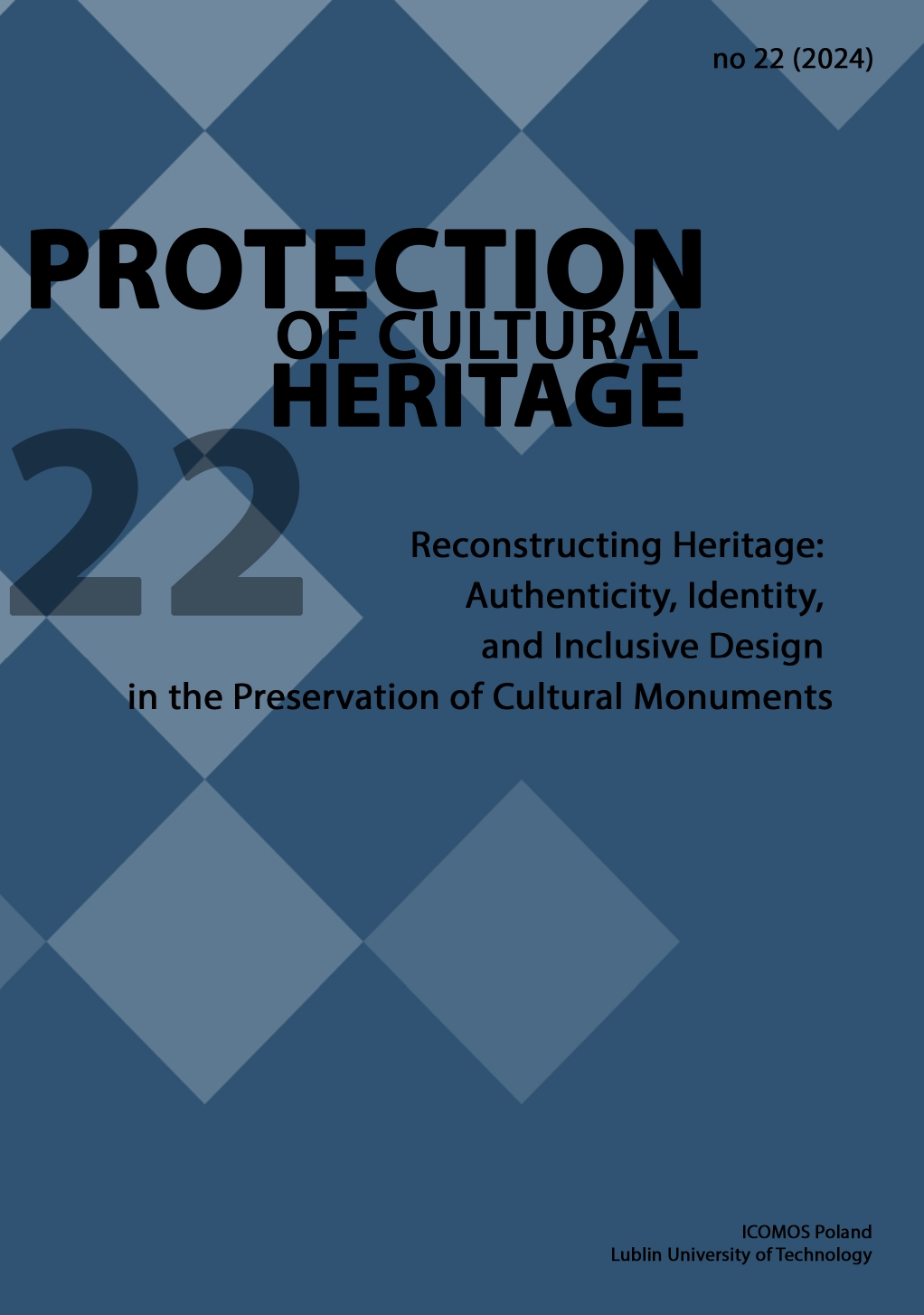Authenticity: A very Greek word in a complex European setting
Article Sidebar
Issue No. 22 (2024)
-
Reconstruction of destroyed architectural monuments in Ukraine:
Between historical authenticity and modern needs of the urban environmentOlesya Chagovets, Olena Zhukova1-32 -
Heritage Authenticity as a Source of Personal and Collective Identity
Jelka Pirkovič33-47
-
The ‘open’ Venice Charter
Learning from the Multiple Interpretations and Translations of the Charter’s Article 9Claudine Houbart, Stéphane Dawans49-60 -
Reflecting on the Venice Charter: Constructing an Accessible Environment for the Preservation of Taiwan’s Cultural Heritage
Chih-Yuan Chang61-75
-
Authenticity: A very Greek word in a complex European setting
Dimitrios Zygomalas77-92
-
The heritage of light and shade in Cairo
The missing principle for conservation in Islamic historic citiesHossam Mahdy93-108 -
Built Heritage Meets Inclusive Design
Identifying Challenges And Strategies Through A Multiple Case Study EnquiryLene Van de Bemdt, Ann Heylighen, Negin Eisazadeh109-127
Main Article Content
DOI
Authors
Abstract
A focal point in present-day conservation terminology, authenticity comes from the ancient Greek word afthentikós, which in modern times has come to mean genuine and valid. Based on this interpretation, it entered the conservation agenda, through the Venice Charter, in 1964, received added attention, through the Nara Document, in 1994, and since then, has generated multiple debates among conservation specialists. Yet while a wide consensus on a definition and method of assessment of authenticity pends, other key players in the European setting, namely national authorities, separate bodies, public groupings, and individual owners endorse, and in many cases, assume action in opposite directions. Considering the practical impact of these contradictions, the overall issue needs to be urgently discussed, which is precisely the goal of this paper. Based on extensive bibliographic and archival research, it initially addresses the evolution of the term “authenticity” and its current standing in the conservation agenda. It then examines and evaluates the aforementioned opposite postures, with reference to characteristic examples throughout Europe, and concludes by outlining proposals for the necessary reconciliation.
Keywords:
References
Anker, J. (2017, November 5). Potsdam hat keinen Platz für die DDR-Moderne. Berliner Morgenpost. https://www.morgenpost.de/brandenburg/article212442859/Potsdam-hat-keinen-Platz-fuer-die-DDR-Moderne.html (retrieved October 2, 2024).
Architectural Uprising - International. (n.d.). Home [Facebook page]. Facebook. Retrieved October 7, 2024, from https://www.facebook.com/ArchitecturalUprising
Architectural Uprising - International [@arch_uprising]. (n.d.). Posts [Instagram profile]. Instagram. Retrieved October 7, 2024, from https://www.instagram.com/arch_uprising
Architectural Uprising - International. (2024, June 26). Architectural Competition. Help us reimagine the façade of a significant building on Madrid’s famous Gran Vía [Link] [Status update]. Facebook. https://www.facebook.com/ArchitecturalUprising/ (retrieved October 7, 2024).
Architectural Uprising - International. (2024, July 7). Before and after in Bordeaux. The French like traditional architecture and build beautiful buildings! [Image attached] [Status update]. Facebook. https://www.facebook.com/photo.php?fbid=122160323810057398&id=61551721954191&set=a.122096293190057398 (retrieved October 7, 2024).
Architectural Uprising - International [@arch_uprising]. (2024, July 7). Before and after in Bordeaux. The French like traditional architecture and build beautiful buildings! [Photograph]. Instagram. https://www.instagram.com/arch_uprising/p/C9IXe4HIyfe/ (retrieved October 7, 2024).
Architectural Uprising - International [@arch_uprising]. (2024, August 16). A new school built in 2019 in Herrnhut (Germany) [Photograph]. Instagram. https://www.instagram.com/arch_uprising/p/C-uQYo6ouH4/ (retrieved October 7, 2024).
Architectural Uprising - International. (2024, August 24). New school in Herrnhut [Image attached] [Status update]. Facebook. https://www.facebook.com/ArchitecturalUprising/photos/new-school-in-herrnhut-before-an-unsustainable-modernist-school-building-now-rep/122166946628057398/?_rdr (retrieved October 7, 2024).
Architektoniki Epanastasi [@arkitektonikiepanastasi]. (2023, June 5). Metatropi acharou ktiriou se neoklasiko (Conversion of a graceless building into a neoclassical) [Photograph]. Instagram. https://www.instagram.com/p/CtHJDVHowfw/ (retrieved October 7, 2024).
Arnóth, Á. (2019). The ethical problems of architectural reconstruction - Hungarian case studies. Protection of Cultural Heritage, 8, 1-8. https://doi.org/10.35784/odk.1021 DOI: https://doi.org/10.35784/odk.1021
Doikas, S. (ed.). (n.d.). Afentis (Master). In LSJ Ancient Greek Dictionaries. Retrieved September 16, 2024, from https://lsj.gr/wiki/%CE%B1%CF%86%CE%AD%CE%BD%CF%84%CE%B7%CF%82
Evangelische Zinzendorfschulen Herrnhut. (n.d.). Der Schulneubau in Bildern. Retrieved October 2, 2024, from https://ezsh.de/neubau/der-schulneubau-in-bildern
Evangelische Zinzendorfschulen Herrnhut. (n.d.). Ein neues Schulhaus für die Zinzendorfschulen. Retrieved October 2, 2024, from https://ezsh.de/neubau
Ghelamco. (n.d.). Foksal 13/15. Retrieved October 8, 2024, from https://www.ghelamco.com/projects/poland/foksal-13-15
Jerome, P. (2008). An Introduction to Authenticity in Preservation. APT Bulletin, 39(2-3), 3-7.
Jokilehto, J. (1999). A History of Architectural Conservation. Butterworth-Heinemann. DOI: https://doi.org/10.1080/13556207.1999.10785249
Kramer, H. (2023, September 4). Potsdams neue Mitte: Erste fertiggestellte Fassaden - aber auch Verzögerungen. Tagesspiegel. https://www.tagesspiegel.de/potsdam/landeshauptstadt/potsdams-neue-mitte-erste-fertiggestellte-fassaden-und-verzogerungen-10415020.html (retrieved October 2, 2024).
Martins Architecture. (n.d.). Logement collectif: Immeuble type XIX. Retrieved October 7, 2024, from https://www.martinsarchitecture.com/fr/projet/33/immeuble-type-xix
Motín Arquitectónico. (2024). Counterproposal - Competition. Madrid Gran Vía 19 [Design brief]. https://drive.google.com/drive/folders/1iqzhu2oVOr9OBP_6scmjZNeCS8rGcbkT (retrieved October 7, 2024).
Motín Arquitectónico [@motin_arquitectonico]. (2024, June 18). Concurso. Por aquí tengo el placer de anunciar el primer concurso español de arquitectura neotradicional! [Photograph]. Instagram. https://www.instagram.com/p/C8Xf2XTNoGF/?img_index=1 (retrieved October 7, 2024).
Neo-Gothic Building of the Royal Ministry of Finance in Buda Castle under Renovation. (2024, January 8). Hungary Today. https://hungarytoday.hu/neo-gothic-building-of-the-royal-ministry-of-finance-in-buda-castle-under-renovation (retrieved September 30, 2024).
Papazachariou, G. (2024, July 4). To noima kai i istoria tis lexis: Afthentikos - Afentis (The meaning and the history of the word: Authentic - Master). Kamini. https://www.kamini.gr (retrieved September 16, 2024).
PI55 Coworking Space. (n.d.). The Building. Retrieved October 7, 2024, from https://www.pi55.com/the-building/
ProPotsdam GmbH. (n.d.). Integriertes Leitbautenkonzept Potsdamer Mitte. Retrieved October 2, 2024, from https://www.propotsdam.de/ueber-uns/unternehmensverbund/sanierungstraeger-potsdam-gmbh/alter-markt
Redakcja Pressland. (2019, September 10). Foksal 13/15 - najpiękniejsze kamienice Warszawy odzyskały dawny blask. Ta inwestycja jest jak prezent dla miasta. Bryla.pl. https://www.bryla.pl/foksal-13-15-najpiekniejsze-kamienice-warszawy-odzyskaly-dawny-blask-ta-inwestycja-jest-jak-prezent-dla-miasta (retrieved October 8, 2024).
Sarantakos, N. (2024, April 17). To afthentiko afentiko (The authentic boss). Sarantakos.wordpress. https://sarantakos.wordpress.com/2024/04/17/afentiko/ (retrieved September 16, 2024).
Stamatakos, I. (1999). Afthentis. In Lexikon Archaias Ellinikis Glossis (Dictionary of the Ancient Greek Language) - (p. 193).
Stovel, H. (2008). Origins and influence of the Nara document on authenticity. APT Bulletin, 39(2-3), 9-17.
Várkapitányság Integrált Területfejlesztési Központ Nonprofit Zrt. (2022). National Hauszmann Program [Imprint]. https://nemzetihauszmannprogram.hu (retrieved September 30, 2024).
Visit Poland. (2024, April 7). Poland is renewing itself, including its buildings! [Image attached] [Status update]. Facebook. https://www.facebook.com/photo.php?fbid=370424022656179&set=pb.100090657513927.-2207520000&type=3 (retrieved October 8, 2024).
Wenk, E. (2019, October 28). Potsdams Antlitz: Die FH ist weg - die Debatte bleibt. Tagesspiegel. https://www.tagesspiegel.de/potsdam/landeshauptstadt/die-fh-ist-weg--die-debatte-bleibt-7901329.html (retrieved October 2, 2024).
Article Details
Abstract views: 303







